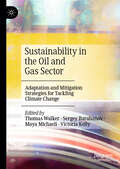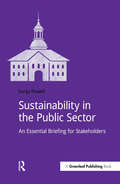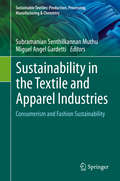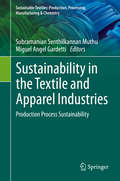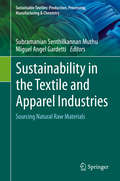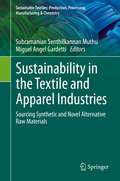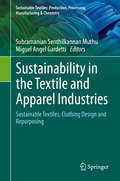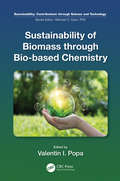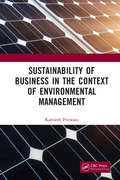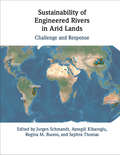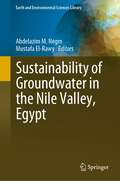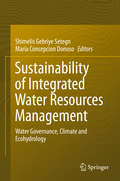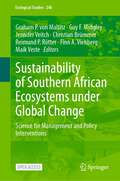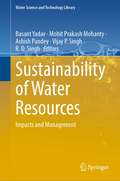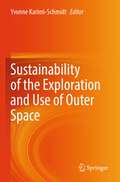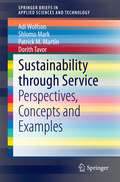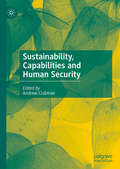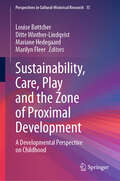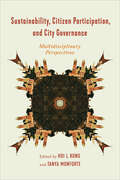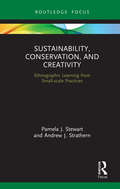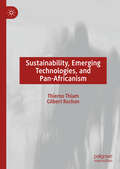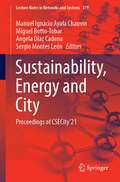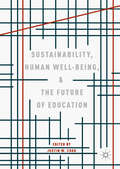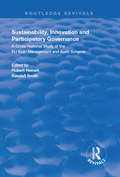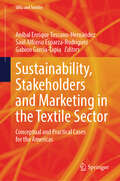- Table View
- List View
Sustainability in the Oil and Gas Sector: Adaptation and Mitigation Strategies for Tackling Climate Change
by Thomas Walker Victoria Kelly Maya Michaeli Sergey BarabanovThe push for sustainability in the oil and gas sector has taken center stage in both climate action debates and mitigation/adaptation efforts in recent decades. As the global mission for sustainable energy increasingly moves away from oil and gas as primary resources, the study of sustainability in the industry is often posited as counterintuitive. However, it is imperative to unearth methods to integrate sustainability efforts in the oil and gas industry, as it will likely retain its prominence in the foreseeable future. This book ignites academic discussion regarding ongoing and necessary mitigation and adaptation strategies in the oil and gas industry that will help address the ongoing climate crisis.The chapters featured in this collection pose several important queries regarding current sustainability efforts in the oil and gas industry and propose avenues for improvement. In particular, they focus on carbon emissions in exploration and production, land use patterns andbiodiversity, and ethics in the oil and gas industry. Working against the background of the UN Agenda 2030 and Sustainable Development Goals, this book will be of great interest to academics and students of sustainability strategies, energy, innovation, and business ethics, as well as policymakers and practitioners tasked with analyzing these areas.
Sustainability in the Public Sector: An Essential Briefing for Stakeholders (Doshorts Ser.)
by Sonja PowellSustainability in the Public Sector provides a quick-start guide for a wide variety of public sector stakeholders, equipping them with knowledge of both the sustainable development challenges and the political backdrop to this agenda.This guide: uncovers the history of the term "sustainable development" and introduces basic sustainability theory; highlights the realities of the politics behind the sustainable development agenda, alongside the responses of successive political administrations; provides a snapshot of how sustainable development in local government is developed and demystifies the roadmap for achieving the UK’s 2050 carbon reduction targets.This book will be invaluable to a variety of public bodies, such as local authorities, and their stakeholders, including councillors, officers, members of Local Enterprise Partnerships, Local Nature Partnerships, scrutiny panels and other forums, in enhancing understanding of both the sustainable development challenge facing us today and the political backdrop to this agenda.
Sustainability in the Textile and Apparel Industries: Consumerism and Fashion Sustainability (Sustainable Textiles: Production, Processing, Manufacturing & Chemistry)
by Subramanian Senthilkannan Muthu Miguel Angel GardettiThis book is part of a five-volume set that explores sustainability in textile industry practices globally. Case studies are provided that cover the theoretical and practical implications of sustainable textile issues, including environmental footprints of textile manufacturing, consumer behavior, eco-design in clothing and apparels, supply chain sustainability, the chemistry of textile manufacturing, waste management and textile economics. The set will be of interest to researchers, engineers, industrialists, R&D managers and students working in textile chemistry, economics, materials science, and sustainable consumption and production. This volume focuses on sustainability aspects of consumerism and fashion, emphasizing the environmental issues that stem from textile care and disposal, and how many of these practices detrimentally impact the environment. Also addressed is the role of consumer knowledge and behavior associated with the clothing industry that may exacerbate these issues, and what can be done to better inform consumers about more sustainable options available to them. The case studies presented cover environmental and social sustainability in the clothing industry, and sustainable development in luxury fashion networks.
Sustainability in the Textile and Apparel Industries: Production Process Sustainability (Sustainable Textiles: Production, Processing, Manufacturing & Chemistry)
by Subramanian Senthilkannan Muthu Miguel Angel GardettiThis book is part of a five-volume set that explores sustainability in textile industry practices globally. Case studies are provided that cover the theoretical and practical implications of sustainable textile issues, including environmental footprints of textile manufacturing, consumer behavior, eco-design in clothing and apparels, supply chain sustainability, the chemistry of textile manufacturing, waste management and textile economics. The set will be of interest to researchers, engineers, industrialists, R&D managers and students working in textile chemistry, economics, materials science, and sustainable consumption and production.This volume addresses the technologies and mechanical processes of textile production, and what sustainable methods can be employed to achieve improved safety and environmental health. The book covers sustainable aspects of printing, dyeing, coloration, weaving, knitting, tailoring, surface design and antimicrobial finishing for environmentally friendly textile and apparel products.
Sustainability in the Textile and Apparel Industries: Sourcing Natural Raw Materials (Sustainable Textiles: Production, Processing, Manufacturing & Chemistry)
by Subramanian Senthilkannan Muthu Miguel Angel GardettiThis book is part of a five-volume set that explores sustainability in textile industry practices globally. Case studies are provided that cover the theoretical and practical implications of sustainable textile issues, including environmental footprints of textile manufacturing, consumer behavior, eco-design in clothing and apparels, supply chain sustainability, the chemistry of textile manufacturing, waste management and textile economics. The set will be of interest to researchers, engineers, industrialists, R&D managers and students working in textile chemistry, economics, materials science, and sustainable consumption and production. This volume comprehensively covers the various sustainable natural materials used in textiles that originate from raw materials sourcing. The book discusses agricultural production systems and standards for the development of sustainable textile fibers, the effects of chemical surface modification methods on the properties of textile fibers, and how antibacterial and antifungal textiles can be manufactured using natural resources.
Sustainability in the Textile and Apparel Industries: Sourcing Synthetic and Novel Alternative Raw Materials (Sustainable Textiles: Production, Processing, Manufacturing & Chemistry)
by Subramanian Senthilkannan Muthu Miguel Angel GardettiThis book is part of a five-volume set that explores sustainability in textile industry practices globally. Case studies are provided that cover the theoretical and practical implications of sustainable textile issues, including environmental footprints of textile manufacturing, consumer behavior, eco-design in clothing and apparels, supply chain sustainability, the chemistry of textile manufacturing, waste management and textile economics. The set will be of interest to researchers, engineers, industrialists, R&D managers and students working in textile chemistry, economics, materials science, and sustainable consumption and production. This volume explores some alternative synthetic raw materials resulting from the recycling and regeneration of renewable textile fibers, and how these sustainable green-based composites can contribute to improved ecological and human health. The book offers insights into the impacts of human-made fibers and microfiber pollution, and how biodegradable material sourcing can help to curb harmful environmental impacts from these practices and achieve clothing and apparel sustainability.
Sustainability in the Textile and Apparel Industries: Sustainable Textiles, Clothing Design and Repurposing (Sustainable Textiles: Production, Processing, Manufacturing & Chemistry)
by Subramanian Senthilkannan Muthu Miguel Angel GardettiThis book is part of a five-volume set that explores sustainability in textile industry practices globally. Case studies are provided that cover the theoretical and practical implications of sustainable textile issues, including environmental footprints of textile manufacturing, consumer behavior, eco-design in clothing and apparels, supply chain sustainability, the chemistry of textile manufacturing, waste management and textile economics. The set will be of interest to researchers, engineers, industrialists, R&D managers and students working in textile chemistry, economics, materials science, and sustainable consumption and production. This volume discusses novel trends and concepts in sustainable textile design, including innovative topics such as doodling and upcycling in clothing and apparel design for sustainable fashion initiatives. Along with strategies for repurposing fashion sustainability, the book also covers university interventions for the development of proper and environmentally friendly design practices. Specific technologies addressed include UV applications, laser treatments for dyeing, refined surface design techniques for products such as leather.
Sustainability of Biomass through Bio-based Chemistry (ISSN)
by Valentin I. PopaThe process of photosynthesis is a potential source of energy and bioproducts. Renewable sources of polymeric materials offer an answer to maintaining sustainable development of economically and ecologically attractive technology. The innovations in the development of materials from biopolymers, preservation of fossil-based raw materials, complete biological degradability, reduction in the volume of garbage and compostability in the natural cycle, climate protection through reduction of carbon dioxide released, and the application possibilities of agricultural resources for the production of bio/green materials are some of the reasons why such materials are attracting public interest.FEATURES Discusses waste from urban areas, forestry and agricultural processes, specifically grown crops such as trees, starch crops, sugar crops hydrocarbon plants and oils, and finally aquatic plants such as water seaweeds and algae, which can be used as raw materials for sustainable development. Presents recent advances in the development of some specifically chemical components of biomasses for a sustainable future. Focuses on lignocellulose as a source of bio-based products. Draws upon expertise from various countries. Describes how upgraded and integrated biomass processing may reduce the risks associated with the COVID-19 pandemic. Valentin I. Popa is professor emeritus of Wood Chemistry and Biotechnology at Gheorghe Asachi Technical University of Iasi, Romania.
Sustainability of Business in the Context of Environmental Management
by Kamlesh PritwaniSustainability of Business in the Context of Environmental Management studies the newly emerged concept of ‘sustainable business’ in view of the growing Indian economy. It explores the current corporate social responsibility practices adopted with special reference to environmental management in Indian companies. The book compares the legal, financial, economic, industrial, and social behavioural aspects. Out of these aspects, industrial aspect in view of ‘environmental management’ is discussed in detail. It also explores the forces driving the changing relationship between business and society and corporate leadership reacting to environmental challenges. Finally, the book restates the concept of increasing profitability through societal development. Please note: This volume is Co-published with The Energy and Resources Institute Press, New Delhi. Taylor & Francis does not sell or distribute the Hardback in India, Pakistan, Nepal, Bhutan, Bangladesh and Sri Lanka
Sustainability of Engineered Rivers In Arid Lands: Challenge and Response
by Regina Buono Sephra ThomasThis interdisciplinary volume examines how nine arid or semi-arid river basins with thriving irrigated agriculture are doing now and how they may change between now and mid-century. The rivers studied are the Colorado, Euphrates-Tigris, Jucar, Limarí, Murray-Darling, Nile, Rio Grande, São Francisco, and Yellow. Engineered dams and distribution networks brought large benefits to farmers and cities, but now the water systems face multiple challenges, above all climate change, reservoir siltation, and decreased water flows. Unchecked, they will see reduced food production and endanger the economic livelihood of basin populations. The authors suggest how to respond to these challenges without loss of food production, drinking water, or environmental health. The analysis of the political, hydrological, and environmental conditions within each basin gives policymakers, engineers, and researchers interested in the water/sustainability nexus a better understanding of engineered rivers in arid lands.
Sustainability of Groundwater in the Nile Valley, Egypt (Earth and Environmental Sciences Library)
by Abdelazim M. Negm Mustafa El-RawyGroundwater is the world’s largest source of fresh water, but its safe and sustainable exploitation remains a challenge. Egypt's Nile Valley aquifer is the most important renewable aquifer, accounting for approximately 85% of total groundwater use in Egypt. Egypt's long-term development and socioeconomic growth in the Nile Valley depends on this groundwater. Concerns about groundwater assessment, quality, management, and sustainability frame the current status of Nile Valley groundwater supplies. Proper knowledge of the current state of the groundwater quantity and quality in the Nile Valley is vital for the development and management of groundwater resources in Egypt. Due to Egypt's water scarcity, the projected decline in Nile River flow due to climate change, and the development of numerous Nile River basin projects, the situation is critical, and the consequences might be severe. Furthermore, Egypt's growing population puts significant strain on groundwater, which is the second most significant freshwater supply next to the surface water supply coming from the Nile River as Egypt’s share. Several books on the various aspects of Egypt's water resources have been published, but there is insufficient recent information on groundwater in the Nile Valley aquifer, which is essential for Egyptian populations for domestic and irrigation purposes. As a result, this book on the groundwater in the Nile Valley aquifer emerges to complete the picture of Egypt’s water resources as a good example of arid country located in MENA regions with many arid countries. Consequently, the lessons learned from this book could be beneficial to other countries in MENA regions, particularly those in North Africa.
Sustainability of Integrated Water Resources Management
by Shimelis Gebriye Setegn Maria Concepcion DonosoThe main focus of this book is sustainable management of water resources in a changing climate. The book also addresses the question of how to define and measure the sustainability of Integrated Water Resources Management (IWRM). The sustainability of IWRM is an important issue when planning and/or developing policies that consider the impact of climate change, water governance and ecohydrology in the context of a more holistic approach to ensure sustainable management of water resources. Sustainable IWRM is more about processes, and relatively little systematic or rigorous work has been done to articulate what components are the most essential to ensure the ongoing sustainability of IWRM efforts. The chapters cover topics including global prospective of IWRM; allocation of environmental flows in IWRM; echohydrology, water resources and environmental sustainability; climate change and IWRM; IWRM and water governance including social, economic, public health and cultural aspects; climate change resiliency actions related to water resources management sustainability and tools in support of sustainability for IWRM. This book will be of interest to researchers, practitioners, water resources mangers, policy and decision makers, donors, international institutions, governmental and non-governmental organizations, educators, as well as graduate and undergraduate students. It is a useful reference for Integrated Water Resources Management (IWRM), ecohydrology, climate change impact and adaptations, water governance, environmental flows, geographic information system and modeling tools, water and energy nexus and related topics.
Sustainability of Southern African Ecosystems under Global Change: Science for Management and Policy Interventions (Ecological Studies #248)
by Maik Veste Graham P. von Maltitz Guy F. Midgley Jennifer Veitch Christian Brümmer Reimund P. Rötter Finn A. ViehbergThis open access book about the sustainability of marine and terrestrial ecosystems in southern Africa provides a synthesis of the research program Science Partnerships for the Adaptation to Complex Earth System Processes (SPACES II, 2018-2022). It addresses the scientific, social, and economic issues related to climate change, its potential impacts on the various ecosystems, adaptations, and management interventions for enhancing systems resilience in Southern Africa. It is written by numerous scientists from African states and Germany and summarizes the latest research findings, which are of great relevance for a better understanding of climate change impacts, adaptations, and vulnerabilities as well as for developing management options and policy options to reduce the associated risks. This is crucial considering that the projected African population increase is exceptional. Furthermore, climate change is assumed to hit southern Africa extremely hard with a significant increase in extreme events and the frequency of severe droughts, heat waves, and flooding. Southern Africa hosts a high variety of ecosystems, which belongs to important biodiversity hotspots for unique flora and fauna. The surrounding oceans form, in turn, a bottle neck within the ocean’s global thermohaline circulation, act as a still poorly understood carbon sink and source and play an important role for fisheries as they are highly productive. Considering these important aspects, the book is an important interdisciplinary contribution to the scientific literature and will find a wide readership.The book is aimed at students, teachers, and scientists in the fields of terrestrial and marine ecology, environmental, nature and landscape planning, agriculture, environmental and resource management, biodiversity, and nature conservation, as well as scientists and representatives in specialised authorities and associations, nature conservationists, and policy makers of related disciplines.
Sustainability of Water Resources: Impacts and Management (Water Science and Technology Library #116)
by Vijay P. Singh Ashish Pandey R. D. Singh Basant Yadav Mohit Prakash MohantyThis book covers a wide spectrum of water resources management, including water supply and demand, operation and maintenance of water distribution systems, water quality assessment, impacts of climate change on hydrological extremes, and water governance. Rapid urbanization, industrialization, and population growth are the major factors contributing to a significant rise in water demands across all the sectors in India. Although the Indian Summer Monsoon Rainfall contributes primarily to the available surface and groundwater resources, recurrent non-uniform/erratic rainfall events have resulted in widespread water scarcity. On many occasions, extreme meteorological conditions trigger the severity of water-related disasters such as floods and droughts. The untreated wastewater from domestic and industrial sources discharged through un-engineered means, adds to the issue as it ends up polluting the surface and groundwater resources.
Sustainability of the Exploration and Use of Outer Space
by Yvonne Karimi-SchmidtThis book provides insight into the significance of the law of outer space in promoting order, cooperation, and peaceful activities in space. It emphasizes the advantages of having a legal framework in place to govern space exploration and utilization, rather than relying on power and force.
Sustainability through Service
by Adi Wolfson Shlomo Mark Patrick M. Martin Dorith TavorThis book discusses the mutual relationship between service and sustainability. It covers methodologies and approaches and describes measurements and tools that can promote sustainability on the service market. Lastly, it presents the different applications of sustainability, together with examples of sustainable services. Environmental concerns have become integral to any decision-making process in the design and implementation of goods and services. With the increasing dominance of the service sector, and as service systems become more complex and interdisciplinary, the focus must move from the exchange of products to that of services. Newly created services should thus aim to incorporate sustainability into their designs while viewing sustainability as a service in its own right. Integrating sustainability in the service design and development process is essential to improving the sustainability of our society and preserving the environment. Moreover, doing so shifts the service boundaries from values that are focused only on personal, local, and current needs and economic profit to those that are broader and more future oriented, ultimately placing greater social and environmental responsibility on all stakeholders. In addition, it advances the current state-of-the-art in sustainable development and service design and contributes to improving the quality of life on a global scale.
Sustainability, Capabilities and Human Security
by Andrew CrabtreeAmartya Sen and Martha Nussbaum have made major contributions to development studies and social philosophy, yet sustainability issues have largely remained outside their domain despite sustainability’s significance and complex relation to their central value of freedom. This volume explores sustainability from a capabilities perspective, with the motif of human security, inviting a lively discussion within the human development family. After introducing the two approaches, authors conceptualize relationships between capabilities and the environment, examine the scientific and normative validity of environmental indicators and analyse intergenerational justice. Climate change is used to exemplify that a human security approach can add an explanatory ontology to the ethical criticisms of contemporary ways of life that champion consumerism. That ontology recognizes shared life experiences, problems and life challenges - a community of fate. The volume ends with a discussion of how the approaches can inform and sometimes critique the Sustainable Development Goals.
Sustainability, Care, Play and the Zone of Proximal Development: A Developmental Perspective on Childhood (Perspectives in Cultural-Historical Research #15)
by Marilyn Fleer Mariane Hedegaard Ditte Winther-Lindqvist Louise BøttcherThis book addresses the central issue of children’s social situation of development in relation to sustainability, care and imagination. The concept of sustainability is topical in current societal discussions, but much in need of further elaboration, which is provided by this book as an integrated aspect of childcare and child development. It provides an exploration of whether and how sustainability can contribute relevantly to conceptual development within the cultural-historical framework with relation to child development more broadly and care and imagination more specifically. A central question in the book is how the concept of sustainability is related to Vygotsky’s writings on the zone of proximal development and the social situation of development. It takes on the current need to understand the problem of creating more sustainable societies and practices as interconnected practices for supporting the development of children as present and future sustainability-responsible citizens. This book provides a much needed theoretical elaboration of child care as a scientific concept, the practice context of care, and a wholistic conceptual approach to care.
Sustainability, Citizen Participation, and City Governance: Multidisciplinary Perspectives
by Hoi L. Kong Tanya MonforteThe inaction of nation states and international bodies has posed significant risks to the environment. By contrast, cities are sites of action and innovation. In Sustainability, Citizen Participation, and City Governance, contributors researching in the areas of law, urban planning, geography, and philosophy identify approaches for tackling many of the most challenging environmental problems facing cities today. Sustainability, Citizen Participation, and City Governance facilitates two strands of dialogue about climate change. First, it integrates legal perspectives into policy debates about urban sustainability and governance, from which law has typically stood apart. Second, it brings case studies from Quebec into a rare conversation with examples drawn from elsewhere in Canada. The collection proposes humane and inclusive processes for arriving at effective policy outcomes. Some chapters examine governance mechanisms that reconcile clashes of incommensurable values and resolve conflicts about collective interests. Other chapters provide platforms for social movements that have faced obstacles to communicating to a broad public. The collection’s proposals respond to drastic changes in urban environments. Some changes are imminent. Others are upon us already. All threaten the present and future well-being of urban communities.
Sustainability, Conservation, and Creativity: Ethnographic Learning from Small-scale Practices (Routledge Focus on Environment and Sustainability)
by Pamela J. Stewart Andrew J. StrathernBy examining how small communities have dealt with forces of change and have sought to maintain themselves over time, this book offers pointers and lessons for conservation practices at all levels of society. "Sustainability" has become an increasingly popular term as a signal of concerns with long-term environmental consequences of human actions. Sustainability as a goal has started to replace "development" as a way of describing policies that go beyond the concept of increasing commercial production or making monetary profits from enterprises. By focusing on topical case histories on agricultural activity, stock-keeping, cash cropping, mining, and renewable energy, the authors highlight how ethnographic studies can and should inform policy decisions at both local and global levels. This book will be of great interest to students and scholars of applied anthropology, sociology, and development studies.
Sustainability, Emerging Technologies, and Pan-Africanism
by Thierno Thiam Gilbert RochonThis book examines the historical antecedents of Pan-Africanism as a driving force of African Unity, carefully studying its major contributors, current institutional status, and potential future growth. It analyzes the facilitative role of emerging technologies, such as high performance computing, telecommunications, and satellite remote sensing in enabling African sustainable development. Finally, the authors discuss possible ways that the vision of Pan-Africanism can be used today in Africa’s efforts towards unity and sustainable development.
Sustainability, Energy and City: Proceedings of CSECity’21 (Lecture Notes in Networks and Systems #379)
by Miguel Botto-Tobar Angela Díaz Cadena Sergio Montes León Manuel Ignacio Ayala ChauvinThis book constitutes the proceedings of the 1st Congress in Sustainability, Energy and City (CSECity’21) held in Ambato, Ecuador, on June 28–29, 2021, proudly organized by Universidad Tecnológica Indoamerica in collaboration with GDEON. The CSECity brings together experts that promotes the dissemination of advances in sustainability, urbanism, energy, and industry research through the presentation of keynote conferences. In CSECity, theoretical, technical, or application works that are research products are presented to discuss and debate ideas, experiences, and challenges. Presenting high-quality, peer-reviewed papers, the book discusses the following topics: Energy sustainability Information and knowledge management Information technologies Innovation, technology, and society Software and systems modeling Software systems, architectures, applications, and tools Sustainable energy and the city.
Sustainability, Human Well-Being, and the Future of Education
by Justin W. CookThis open access book explores the key dimensions of a future education system designed to enable individuals, schools, and communities to achieve the twin twenty-first century challenges of sustainability and human well-being. For much of the twentieth century, Western education systems prepared students to enter the workforce, contribute to society and succeed in relatively predictable contexts. Today, people are at the controls of the planet—making decisions that are dramatically reshaping social, economic, and environmental systems at a global scale. What is education’s purpose in this new reality? What and how must we learn now? The volatility and uncertainty caused by digitalization, globalization, and climate change weave a common backdrop through each chapter. Using case studies drawn from Finland and the US, chapter authors explore various aspects of learning and education system design through the lenses of sustainability and human well-being to evaluate how our understanding and practice of education must transform. Using their scholarly research and experience as practitioners, the authors propose new approaches to preparing learners for a new frontier of the human experience fraught with risks but full of opportunity.
Sustainability, Innovation and Participatory Governance: A Cross-National Study of the EU Eco-Management and Audit Scheme (Ashgate Studies In Environmental Policy And Practice Ser.)
by Hubert HeineltTitle first published in 2003. This book focuses on whether participatory governance can lead to sustainable and innovative outcomes. Using an empirical analysis of the development, implementation and review of an EU environmental management system - the Eco-Management and Audit Scheme (EMAS), it examines under which circumstances participatory governance might encourage sustainability and innovation.
Sustainability, Stakeholders and Marketing in the Textile Sector: Conceptual and Practical Cases for the Americas (SDGs and Textiles)
by Aníbal Enrique Toscano-Hernández Saúl Alfonso Esparza-Rodríguez Gabino García-TapiaGeospatial analysis of the Sustainable Value Chain in the Textile sector of the United States.- Sustainable practices in the textile sector: Case study of the global value chain of the American economies.- Exploring eco-innovation performance in the textile industry: Case of two export-oriented Colombian firms.- Transformational and sustainable leadership in textile companies in Lima: a qualitative study.- Obstacles to innovation in textile SMEs in the Usaquen district of Bogota, Colombia 100 Reverse Logistics: A view from green capitalism and circular economy in textile companies in Mexico.- Green marketing strategies in sustainable fashion business models.- Green marketing and its contribution to the competitiveness of the textile and apparel sector. Case study in Cali.- The green swan´s theory and circular economy and it’s influence in regenerative capitalism.- Competitiveness of decent work of the us textile sector using a multivariable classification of the sdg 8 target 5: full employment and decent work.- Critical evaluation of successful strategies for sustainable manufacturing in the textile sector and their impact on the sustainable development goals: Case studies in Colombia.
